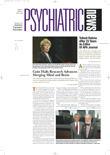Although supportive, child-centered, and eclectic therapies are used most often to treat sexually abused children, trauma-focused cognitive-behavioral therapy (CBT) is more effective for them, various researchers have found.
Now another study, with a much larger and more diverse subject sample, suggests the same thing.
It was headed by Judith Cohen, M.D., a professor of psychiatry at Drexel University College of Medicine in Pittsburgh and an authority on posttraumatic stress disorder (PTSD) treatment for children. Results were published in the April Journal of the American Academy of Child and Adolescent Psychiatry.
“Clinical implications are that for posttraumatic stress disorder and related symptoms [in children], trauma-focused cognitive-behavioral therapy interventions should be tried or included as a prominent part of therapy,” Cohen told Psychiatric News.
The study included 229 youngsters, aged 8 to 14, who had been sexually abused. The children had significant symptoms of PTSD, with 89 percent meeting full DSM-IV criteria. More than 90 percent of the youngsters had experienced traumatic events in addition to sexual abuse. Compared with previous studies on the subject, the subject sample was not only considerably larger, but included greater gender diversity and subjects from two—rather than one—geographic regions. (The sample also included both white and African-American youngsters, but few Hispanic and no Asian children, which reflected the ethnic populations in the geographic areas studied.)
Half the subjects received child-centered therapy, which is similar to the type of therapy used in rape crisis centers. The therapist listened, empathized, and encouraged both the traumatized children and their parents to talk about the trauma the children had experienced, yet let them set the pace in this regard. The therapist also encouraged both the children and their parents to formulate their own strategies for behavioral change rather than dictate it to them.
The other half of the subjects received trauma-focused CBT—a form of therapy that has been found to be highly effective for adult PTSD (Psychiatric News, December 7, 2001). As sessions proceeded, the children were encouraged to confront increasingly detailed and distressing abuse-related reminders and memories. Children created narratives of their sexual abuse experiences, usually by writing and illustrating a book, which was shared with their parents in parallel therapy sessions.
Three joint parent-child sessions were also used to optimize comfortable communication, provide education about personal safety and healthy sexuality, and allow the children and their parents to share and discuss the children's trauma narratives together.
A limitation of the study was the absence of a treatment control group, Cohen and her coworkers pointed out in their study report. “We chose not to include such a group because of ethical concerns, and also because previous studies have demonstrated little or no symptom improvement in sexually abused children during wait-list periods,” they explained.
After subjects received an average of either 11 sessions of child-centered therapy or 11 sessions of trauma-focused CBT, the researchers compared their psychological status at the start of therapy with that at the end. Subjects in both therapy groups had improved significantly. The researchers then compared the improvement of the children in both groups and found that the CBT group had improved significantly more than the child-centered therapy group.
For example, at the start of therapy, there were comparable numbers of youngsters in each therapy group with PTSD. Yet by the end of therapy, of the 91 youngsters who had received child-centered therapy and for whom complete data were available, 42 (46 percent) still had PTSD at the end of therapy, compared with 19 of the 89 youngsters (21 percent) who had received trauma-focused CBT.
Results also showed that subjects assigned to trauma-focused CBT showed significantly more improvement with regard to depression, behavioral problems, and shame. Similarly, parents of the trauma-focused CBT group showed greater improvement than parents of the child-centered therapy group in terms of depression, abuse-related distress, and psychological support for their children.
These findings thus reinforce those from earlier studies that short-term, trauma-focused CBT is highly effective for sexually abused children.“ Given the mounting research documenting the severe and long-lasting risks associated with child sexual abuse, it is critical that we provide sexually abused children with the most effective treatment as early as possible,” Cohen and her team concluded.
An abstract of the study, “A Multisite, Randomized Controlled Trial for Children With Sexual Abuse–Related PTSD Symptoms,” can be accessed online at<www.jaacap.com> by clicking on “Archive” and the April 2004 issue.▪
